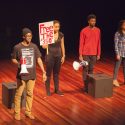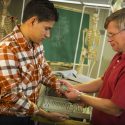Summer class helps K-12 teachers tap into spoken word
Whether spoken aloud or written, words carry power.
The University of Wisconsin–Madison is offering a special class for teachers and youth services personnel, most from Madison and Milwaukee, on harnessing the might of spoken words.
“One thing that makes spoken word so powerful is that it is profoundly social,” says Paula Wolfe, course instructor and UW–Madison assistant professor of curriculum and instruction. “Rather than writing in isolation, students are encouraged to share their work. Students see the power of their words through the effect on an audience.”
Collaborating with Wolfe will be a cross-section of practicing hip-hop artists and spoken-word poets:
- Alex Pate, poet and author on the faculty of the University of Minnesota, where he teaches a course on the Poetry of Rap, Tuesday, July 25.
- J. Otis Powell, Twin Cities poet and performance artist, Wednesday, July 26.
- Peter Kahn, spoken word teacher, Thursday, July 27.
Spoken word is itself a grassroots phenomenon in urban centers around the world. As a movement, its origins are hard to trace, and difficult to attribute to any one culture or practice. Wolfe says that definitely in the mix, though, are West African griot (a form of musical storytelling); bebop; and the Black Arts Movement of the 1960s, which fused spoken words with music to make personal and social statements.
Spoken word differs from traditional poetry like a play differs from a novel. “Spoken word is as much about oral performance and rhythm as it is about poetics,” Wolfe says. “Traditional poetry is designed to be purposefully opaque. The reader is required to do multiple readings. On the other hand, spoken word poetry does not exist after the performance.”
The course will help teachers and others in the community bridge the gap between adult mentorship and street culture. Under its auspices are Youth Speaks Wisconsin, a performance and writing venue for spoken word artists of all levels. In fall 2007, UW–Madison will launch First Wave Spoken Word and Urban Arts Culture learning community for first-year students.
“Spoken word and hip-hop in the classroom can give voice to many students who are systematically marginalized in traditional schooling,” Wolfe says.
“We aren’t talking about throwing anything out, but about embracing new forms of communication that currently are being practiced in contemporary communities,” she adds. “I expect those questions will take up the entire two weeks of the class.”
Daylong classes run through July 28 in Vilas Hall’s Gilbert Hemsley Theatre. For specifics about school district participation, contact William Ney, (608) 890-1055, wney@wisc.edu. For more about class content, artist appearance schedules or to observe, get in touch with Wolfe, (608) 263-1007, pwolfe@wisc.edu.



